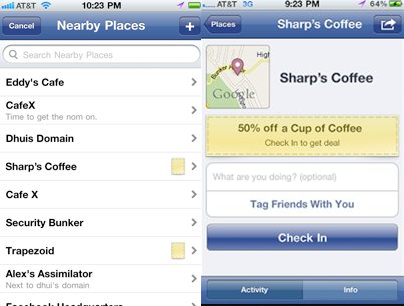
Facebook is throwing its hat into the quickly growing local deals business. During a press event on Wednesday, the company announced that it was tying its location-based Places platform in with local businesses so that users can get coupons and discounts when they check into businesses around town. Not only that, but they can unlock specific deals if they tag their friends along with their check-ins.
Although Facebook is certainly not the first (or second, or third, or fourth) company to get into the deals trade, Facebook has the unique advantage of being able to offer relevant discounts at the exact moment the user could take advantage of them: when he or she is at the business. Groupon, by comparison, has a huge audience but is reliant on users buying coupons with the intent to use them sometime in the future—not necessarily right now.
The obvious intent is to use the Deals platform (via Places) through Facebook's mobile apps on iPhone, Android, and the Web. Mobile was, after all, the main focus of Facebook's press conference—the company is releasing an updated Android app today that brings it to "general parity" with the iPhone app, and an updated iPhone app is coming as soon as Apple approves it (the mobile site already has all the new features).
The updated apps all received improved friend tagging when checking into Places and the ability to upload photos right when you check in, all tying into the new Deals platform. (The updated apps will also get the recently announced Facebook Groups support.) When users go to check into a business, they can see which businesses are currently offering deals by the yellow icon next to their names. Most of these deals require a check-in to qualify, at which point you simply show your phone to the cashier to get the discount. When asked how Facebook will prevent users from defrauding the Deals platform by checking in fake friends to get a group deal, Facebook CEO Mark Zuckerberg responded by saying that it's "hard to lie about people you're with when you're supposed to be there with them."
There was other, non-deal news that came out of the press event as well. Facebook announced that it was opening up all of its Location APIs (previously, only the read API was open) so that app developers can write check-ins to Facebook as well as search within the database. "Our goal with Places is not to build a Places app, but to build a location platform," Zuckerberg said. Location-based service Loopt then demoed its own app, which has been updated with Facebook Places integration. Loopt users can see Facebook friends on their maps, and their own check-ins can now be cross-posted to Facebook.
The other mobile-related announcement was the introduction of "single sign-on." Facebook hopes that users will entrust the company to handle all of their logins for services like Zynga, Groupon, Yelp, Flixter, and BooYAH (all launch partners) when it comes to signing in on a mobile device so that they don't have to inconvenience themselves with multiple logins. "No more mashing into touchscreen glass, no more forgotten passwords" was the mantra from the Facebook team.
What news wasn't announced at Facebook's mobile event? For one, Zuckerberg shot down the idea that a native iPad app will be coming anytime soon. "iPad's not mobile. Next question," he barked at a member of the press during the Q&A. The exchange almost made it seem like Zuckerberg had some latent beef with Apple, but he later he came back to the issue by apologizing and explaining further.
"I don't mean to be rude towards Apple. We all love Apple products," Zuckerberg said. "When we have something to talk about with that, just like everything else, we'll talk about it."
Zuckerberg also categorically denied recent rumors that Facebook was working on a mobile phone of its own. "What a novel idea!" Zuckerberg said. "Um, no."
Three snaps in a Z, Mark.
reader comments
12